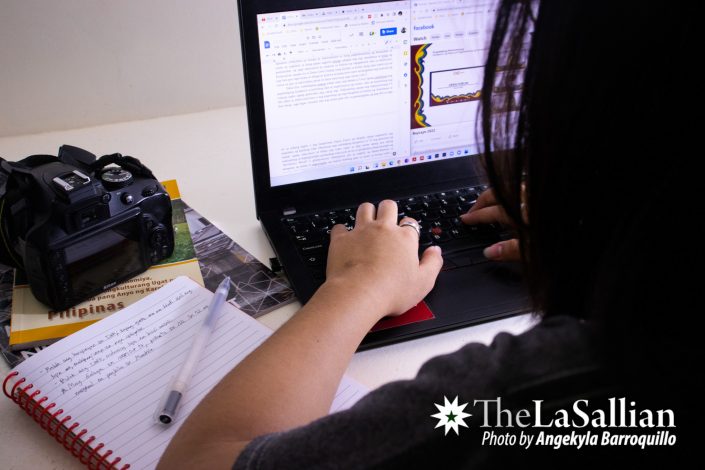Journalism has evolved from merely asking questions and reporting facts to also including deep analysis and fighting fake news. In their talk for Ang Pahayagang Plaridel’s Para Sa Bayan at Lasalyano (BayLayn) 2022 held last June 18 on Zoom and Facebook Live, renowned journalists shed light on what journalism really is. Meanwhile, community workers shared their concerns on the media’s “lacking” coverage of voiceless groups.

Vocation, not a job
In this age where journalism has taken on new forms, vloggers have started reporting their own takes on news and information, and even going to the extent of claiming to be at par or better than traditional journalists. With this, Rappler journalist Mara Cepeda asserted that journalists differ in their pursuit of truth-telling.
“Meron tayong (journalists) mga prinsipyo at guidelines na sinusunod; ‘di lang tayo bumabase sa opinyon natin—pinag-aaralan natin ang isyu; hinahanap natin ang all sides of the truth,” she said.
(We journalists have principles and guidelines that we follow. We do not simply base it on our opinions—we study the issue; we look for all sides of the truth.)
Meanwhile, ABS-CBN journalist RG Cruz shared that journalists carry with them a sense of responsibility and accountability. The fact that journalists have teams to check their work sets them apart from vloggers who share information without considering the ethical implications of their stories.
“They are not accountable. They do not undergo the same processes we journalists undergo. If you are a vlogger, you do not have an editor, producers, nor bosses to tell you if your story is still ethical,” Cruz said in Filipino.
As watchdogs, journalists keep a watchful eye on politicians when they fail to uphold their duties as leaders and citizens of the country. “I [hold] elected officials to a higher standard kasi we elected them precisely because they are supposed to be better than all of us,” Cepeda shared.
The reporter’s fight continues
Cepeda claimed that outgoing president Rodrigo Duterte’s administration has caused social media to be weaponized to boost lies and propaganda.
She emphasized that journalists ought to be gatekeepers who report news that highlights context, and is fact-checked and analyzed. “Tapos na kasi ‘yung ‘he said, she said’ reporting na ipa-parrot mo lang ‘yung sinabi ng pangulo, halimbawa,” Cepeda opined.
(“He said, she said” reporting is over, where, for example, you just parrot what the president said.)
The ripple effect of Duterte’s aggression against journalists is evident in the outcomes of the recent National and Local Elections, the journalists implied. Cepeda asserted that the incoming administration of Ferdinand Marcos Jr. has benefitted from the existing machinery of trolls and attacks that aided his campaign.
Despite all the attacks against journalists, Cepeda stated that she believes media organizations should regain the public trust. “Ang challenge talaga sa’min is innovative storytelling, pumunta kung nasaan ang audience ngayon, at nasaan na sila? Nasa Tiktok, nasa YouTube,” she said.
(…go where the audience is, and where are they? On Tiktok, on YouTube.)
Media and the minority
Recalling her experience as a volunteer teacher in Lumad schools, one of BayLayn’s panelists Teacher Mayka described media coverage as “kulang na kulang” as media only covers situations they deem big enough.
“Madalas binabalita lang o nababalitaan lang na’tin—lalo na sa mga mainstream midya—‘yung nangyayari, ‘yung kalagayan ng mga minorya, ng mga Lumad, kapag grabe ‘yung sitwasyon. Parang kailangan [mayroon] munang massacre na nangyari bago sila ibalita or [mayroon] munang malalang harassment,” shared Mayka.
(We only hear news about minorities like Lumads when the situation is grave. It is as if there should be a massacre or cases of harassment first before they get media coverage.)
The panelists also elucidated on how the media should frame news stories regarding minorities, emphasizing that minorities should also be given the chance to narrate their side of the story as they are often left voiceless in the newsmaking process.
Furthermore, Chairperson of Alyansa sa Mamumuo sa Sugbo Kilusang Mayo Uno panelist Jaime Paglinawan also stressed the importance of “social investigation” in journalism. He explained that mere interviews are not enough, but rather journalists shall cover and do their research on the ground to get a better understanding of the sector they are trying to cover.
“‘Yun ang panawagan namin sa mga journalists, sa inyong mga future journalists: kailangan suriin. Puntahan niyo ang mga sektor hindi lang galing sa pag-interview [ang ibabalita]. Puntahan niyo ang tunay [nilang] kalagayan doon sa pabrika, sa kanilang mga bahay,” asserted Paglinawan.
(Our plea to journalists and future journalists: analyze and do not merely base your story on interviews. Visit factories and houses of sectoral representatives to see their real state.)
